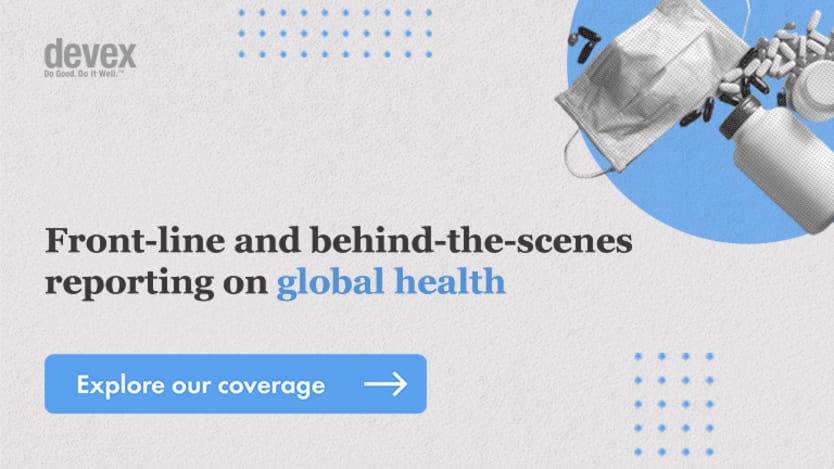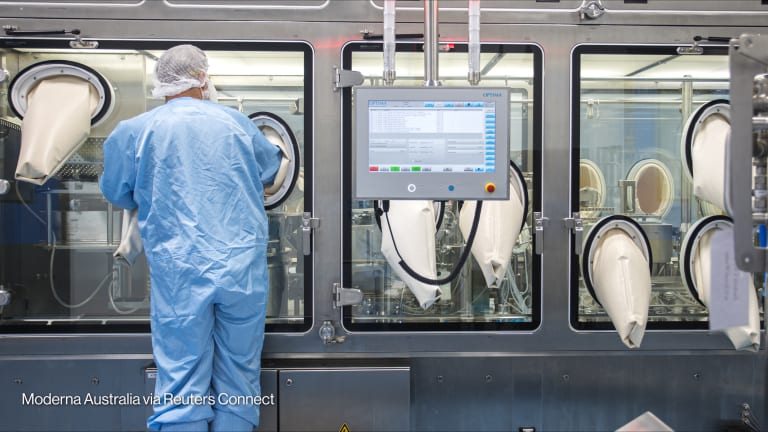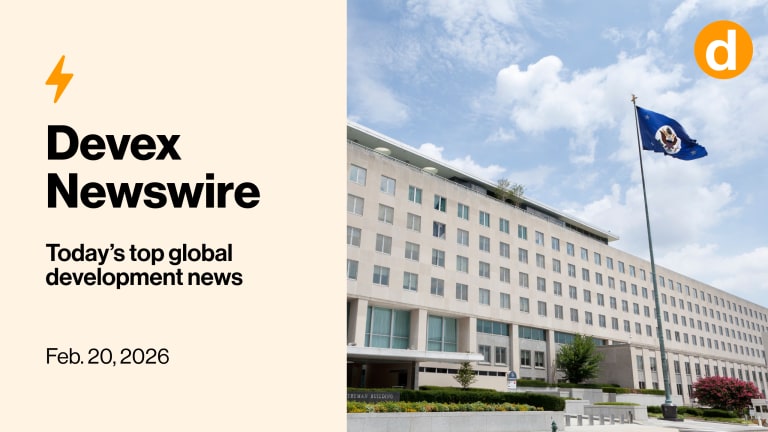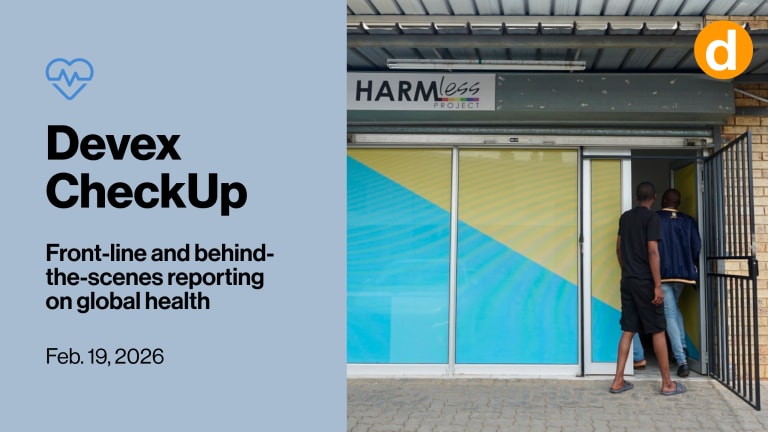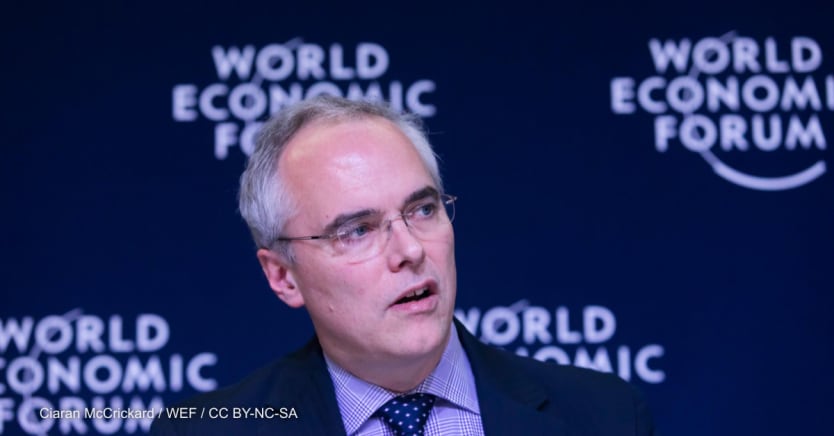
The leadership of the Coalition for Epidemic Preparedness Innovations was just beginning to start planning for the future of the partnership when COVID-19 struck.
Sign up for Devex CheckUp
The must-read weekly newsletter for exclusive global health news and insider insights.
Launched in 2017 at the annual high-profile gathering of political and economic leaders in Davos, CEPI had a $1 billion funding target for its first five years and investments from a mix of governments and donors, like the Bill & Melinda Gates Foundation.
Conceived in the wake of the West Africa Ebola outbreak that killed more than 11,000 people, the coalition intended to focus its first five years on accelerating the development of vaccines for emerging infectious diseases, like Lassa and Nipah viruses, that have traditionally been overlooked by vaccine developers.
By the third quarter of 2019, CEO Richard Hatchett said CEPI was just beginning to “map out how we get to the point that we’re ready at the beginning of 2021 to make the case for whatever comes next for CEPI.” The COVID-19 pandemic that began just a few months later would transform the organization’s work — and its plans for the future.
CEPI was catapulted into a leadership role in the coronavirus response, helping along with GAVI, the Vaccine Alliance and the World Health Organization to coordinate the Access to COVID-19 Tools Accelerator — which has become the linchpin of global efforts to provide much of the global south with vaccines — and announcing plans last month to help the African Union advance vaccine development and manufacturing on the continent.
“I strongly believe that what this pandemic has shown is that having the governance right, the cooperation framework being right, is the key to deliver anything at the global level,” said Amadou Sall, the director of Senegal’s Institut Pasteur in Dakar. “That’s the role that CEPI is playing.”
“Where are the member states and where is the mandate of the people, particularly when there are foundations and CEOs and shareholders that seem to have a great influence over global health policy?”
— Fatima Hassan, head, Health Justice InitiativeThe lessons of the pandemic run through the preview of the new $3.5 billion investment case that CEPI released in March, which will ultimately guide the coalition’s strategy from 2022 to 2026. $1 billion of that money is earmarked for ongoing work around COVID.
“We started with, ‘What does the world need?’,” Hatchett told Devex. “Once we had a vision of what the world needed, it became, ‘How can CEPI contribute to helping bring that about?’”
The strategy, known as CEPI 2.0, will be fleshed out over the course of this year. It’s headlined by a “moonshot” objective of reducing the timeline for future vaccine development to 100 days.
“We’ve got to compress the timelines for development radically over even what was accomplished last year, which itself was a radical compression of anything that had ever been accomplished before,” Hatchett said.
To do so, CEPI is building on the idea of prototype pathogen preparedness, where researchers develop an in-depth knowledge of — and possible response to — prototype viral pathogens, essentially giving them a head start when threats from within those viral families actually emerge.
That does not mean CEPI is “ turning our back on the epidemic diseases we were working on,” Hatchett said. Instead, the increased awareness of CEPI’s activities may also help elevate the work it was already doing to advance vaccines against other high-risk but traditionally overlooked pathogens.
The strategy also lays out a plan for preparing the tools needed to then accelerate access to those vaccines, particularly in the global south. That includes building clinical trial networks that are prepared to rapidly test new vaccine candidates and ramping up vaccine manufacturing capacity, especially in low- and lower-middle-income countries.
“We’ve been pulled into large-scale manufacturing,” Hatchett said. “That’s clearly what the world needs and we’re going to expand capabilities in that domain.”
That does not mean CEPI will be building manufacturing facilities, but assisting in the years-long process of developing a country’s capacity, including linking governments with funders, assisting with technology transfers, improving regulatory capacity, and helping grow a workforce.
Sall, who previously served on CEPI’s strategic advisory committee, applauded the coalition’s emphasis on improved manufacturing capacity in the global south.
“We need to see more support on the African vaccine manufacturing,” he said. “For this epidemic and the coming ones, if we do not have self sufficiency, then we will face the same problems we are having right now,” particularly the vaccine nationalism that has left the vast majority of the continent without access to COVID-19 shots.
Even as CEPI 2.0 looks to expand the coalition’s reach, civil society groups are questioning the growing prominence of multinational not-for-profit players, like CEPI and GAVI.
There are concerns around the transparency of the deals they strike to support vaccine development and the alliances they broker.
As those decisions have a growing impact, particularly on people in the global south, there are more questions about how to demand accountability.
“The model of global health is coming into sharp focus in this pandemic, with the role of the WHO and of CEPI and other institutions,” said Fatima Hassan, the head of Health Justice Initiative, which advocates for access to medicines. “But where are the member states and where is the mandate of the people, particularly when there are foundations and CEOs and shareholders that seem to have a great influence over global health policy?”
She said the issue takes on more urgency as CEPI emerges as a global agenda setter. This was highlighted when the U.K. government, which hosted the recent G-7 conference, integrated the call for a 100-day vaccine timeline into the agenda for the meeting of developed economies.
Ultimately, Hatchett said, one of CEPI’s main strengths — and a central component of CEPI 2.0 — is the ability to facilitate connections, including with governments, to address a broad range of issues along the process from research to manufacturing.
“CEPI’s role has been to fill gaps,” he said. “We’re willing to step into an area where something needs to be done and where nobody owns it.”
